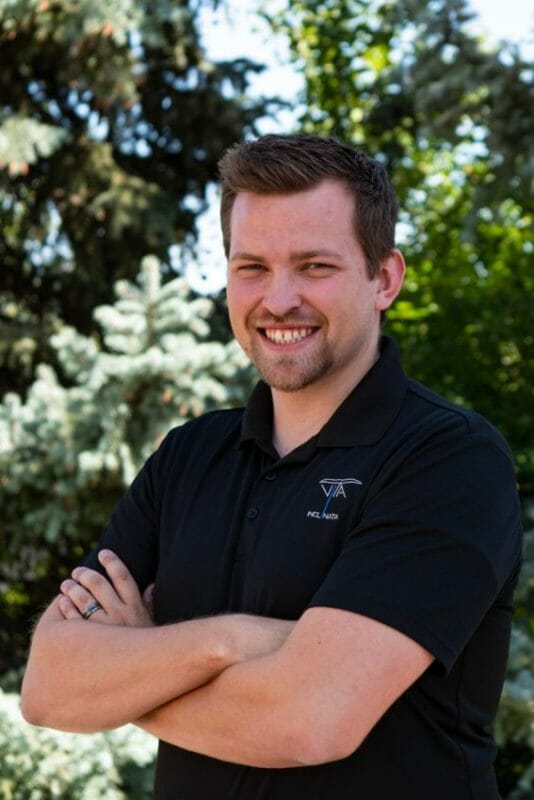In March of 2022, a friend reached out to me after viewing my company’s, Vita Inclinata, Vita Rescue System (VRS) under a Kyiv bombing post on LinkedIn. This friend had an epiphany and asked me,
“Can your Vita Rescue System help with the Ukraine war efforts?” There was not a question in my mind—it could help. Fortunately, the moment also had a degree of fate, the head of Ukraine’s emergency service was next to my friend when he viewed the LinkedIn post and he was intrigued by what he saw.
As a volunteer firefighter for Bennett-Watkins Fire Rescue in Colorado, I leverage my EMT License/Search, Rescue, and Wilderness First Responder certification to save lives in my community–helping those in need is in my blood. So when asked if I could help the Ukrainians, the only answer was, “Yes, whatever it takes.”
I was in a unique position to help the war effort. The Vita Rescue System is a breakthrough technology that leverages high-powered electric duct fans (EDFs) outfitted with motion sensors attached to a litter basket. The stabilization system senses movement, the environment, and angular momentum and automatically stabilizes the load with less than a .25-second response. I knew this innovation would decrease the time to extract the wounded and fly them to a medical treatment facility.
Working with the Ukrainian Ministry of Internal Affairs and the State Emergency Service, I was able to reserve a Russian-made Mi-8 twin-turbine helicopter to conduct Vita Rescue System MEDEVAC training in Uzhgorod for Ukrainian Special Aviation Unit crews. That was the easy part. The tricky part was figuring out how to successfully get this new technology into a war zone without being harmed or captured.
Into The War Zone
Accompanied by my co-worker Scott Slack, on April 11, 2022, we loaded the VRS system into an a rented car and proceeded from Poland to cross the border into Ukraine. During the eight-hour journey, armed guards stopped and questioned us at multiple checkpoints. In a country filled with suspicion and tension, a small car with unknown technology strapped to the roof, an American Flag in the window, and displaying Polish license plates warrant close inspection.
At one point, Ukrainian police officers patrolling a checkpoint promptly stopped our vehicle for examination. As the police officers searched, tensions escalated as one of the guards found pictures of several other checkpoints on Scott’s camera. The discovery immediately prompted drawn guns to be pointed at us, and “Russian? Russian?” shouted in panic. I explained we were coming from a press conference conducted several hours ago in Lviv and—Scott backed it up with pictures from the camera. However, we were separated and brought into police vehicles for interrogation. But after our passports, driver’s licenses, and other paperwork checked out; we were free to continue our journey.
On April 12th, we arrived at an airbase, approximately 20 miles from bombing in eastern Ukraine and Russian contested airspace, to conduct the Vita Rescue System training. However, I faced another hurdle, none of the Ukrainian crew spoke English, and the translator was missing. However, I prevailed and introduced cutting-edge rescue technology and trained Ukraine crews in under four hours to conduct high-risk evacuation missions. Vita Inclinata’s mission of saving lives was validated through our actions.
Due to this mission, the State Emergency Service of Ukraine formally requested 30 VRS systems to extend this MEDEVAC capability to their fire and rescue units on the eastern front. In addition, eleven members of the United States Congress sent a letter to Assistant Secretary Lewis and Director Hursch, calling their attention to the request by the State Emergency Service of Ukraine for “innovative American technology” rescue basket stabilization systems. The letter refers to the VRS as “a generational leap forward” and a “groundbreaking system.” The Ukraine mission has inspired members of Congress to acknowledge the opportunity to provide life-saving equipment for the Ukrainian emergency services and urge others to get these rescue basket stabilization systems to Ukraine “without delay.”
Editor’s Note: Mr. Caleb B. Carr J.D. is the Chairman of the Board of Directors and Chief Executive Officer for Vita Inclinata Technologies, a Denver, Colorado-based aerospace and industrial company. Caleb started his career as a volunteer search and rescue tech for Multnomah (Oregon) County Search and Rescue. A mentor and fellow volunteer suffered cardiac arrest while on a night-training mission, and this accident became the genesis of Vita Inclinata.
Caleb graduated from the University of Colorado at Denver with a Bachelor of Science in Neuroscience and a Bachelor of Arts in Public Policy. He also enrolled in the Mitchell Hamline School of Law and graduated with a Juris Doctor (focused on corporate law and civil litigation.) Currently, Caleb is completing final coursework for his Master’s in Business Administration from Penn State University.
Caleb continues to serve as a volunteer firefighter, search and rescue tech, and Assistant Professor of Entrepreneurship at the University of Colorado. His work at Vita Inclinata Technologies has won recognition such as “Forbes 30 Under 30” for the Manufacturing and Industry category, Titan 100 CEO winner, and the Ernst & Young Entrepreneur of the Year for the Desert Mountain Region. He has rung the NASDAQ opening bell and been published in Forbes, CNN, CNBC, Fast Company, NBC News, and many other outlets for his work.
